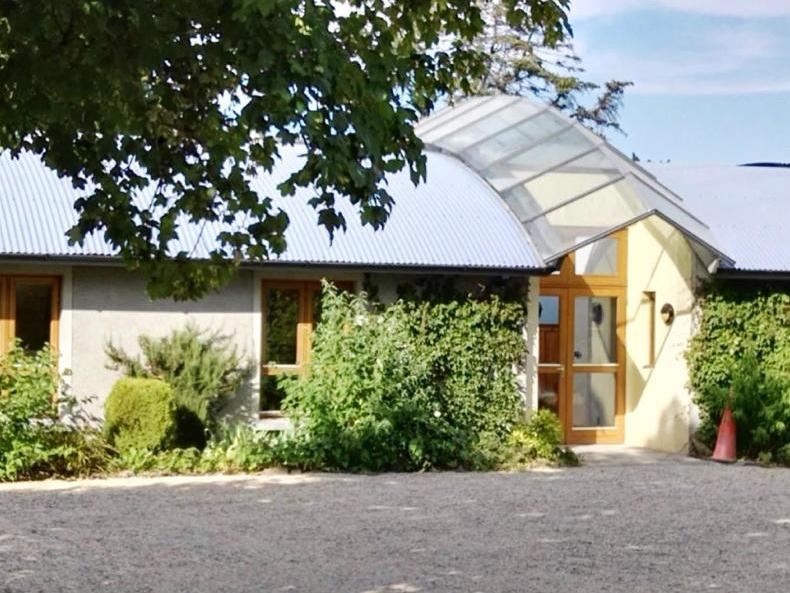I know it’s macabre but I’ve always had an interest in graveyards and there is something breathtakingly beautiful in the simplicity of the Quaker graveyard in Limerick. Large yew trees stand like sentinels in the corners, while bright daffodils dip their heads between rows of neat, uniform headstones. Surnames I’ve never seen before like Bennis and Unthank are inscribed on stone. Outside the high grey walls, I can sense people getting up and putting the kettle on for Sunday breakfast, unaware that inside these walls people are living and worshipping in a neatly carved oasis on the city’s edge.
Most Irish people associate the Quakers with famine soup kitchens
The Quakers have been in Limerick for centuries, quietly working away. One of the first things I notice upon entering are pictures and references to their work during the famine. Most Irish people associate the Quakers with famine soup kitchens (they were one of the Protestant sects who did not ask Catholics to convert for soup), but they are known for their activism throughout the world. They were early abolitionists and played a key role in operating the underground railroad in America which transported escaped slaves from the southern states through a network of safe houses to freedom in the North. In 1947, they were awarded the Nobel Peace Prize in recognition for centuries of peace work.
A Protestant sect spawned by the religious discord of the English civil war in the 1640s, they were marked by their belief that “there is that of God in every person”.
This proved important for thousands of Britons during the Industrial Revolution, when the average life expectancy of workers was 35, Quaker families such as (the) Cadburys and Rowntrees custom built worker accommodation with real living standards. In other words, they treated their workers like they had a unique aspect of the divine that deserved to be respected.
We enter a light-filled room with floor length windows in complete silence
However, let’s not sing their praises too loudly. Cadbury’s is one of the chief reasons sticking to my Lenten vows is so difficult. The Quaker or Society of Friends, community is relatively small with less than half a million followers around the world. When I pop my head into the Quaker house, a small group are assembled for book club which is held once a month.
As 11am approaches, the group rise and make their way to Sunday worship. We enter a light-filled room with floor length windows in complete silence. In the centre is a wooden table with various books, including the Bible. Around the table on three sides are rows of free-standing pews. Everyone takes a seat around the room and settles into silence.
Clerk of the Limerick Quaker House Meg Harper tells me before the meeting that no one speaks unless they felt the Holy Spirit moves them.
“Someone will say something or someone could sing,” she explains.
“I’ve even been at a meeting where somebody got up and danced.”
I have my eyes closed but take a peak around the room for any likely happy feet. Everyone is sitting peacefully with their eyes shut. I close mine and listen to the wind outside.
From the other side of the room, the silence is punctuated by a loud, happy slurp as a baby starts nursing
The whirring skip of my thoughts slows to a steady rhythm. The next time I open my eyes, half an hour has passed without me noticing.
From the other side of the room, the silence is punctuated by a loud, happy slurp as a baby starts nursing. I can feel the warmth from the collective smile of the group. A woman rises and addresses the “friends” at the meeting and speaks about how glad she is to be there and how beautiful the sound of the baby is. The bright heads of the daffodils nod their assent outside the window. The woman sits down and we resettle into a quiet rhythm of breathing and listening.
The meeting comes to a close and the tea trolley is duly wheeled out, as old friends greet each other and the baby is fussed over.
From abolitionists, to famine times, many Quakers are now climate activists
Meg is keen to tell me that even though there was a Bible on the table, Quakers do not have to be theistic, it’s more the system of belief in conscientious activism. From abolitionists, to famine times, many Quakers are now climate activists. Even in their graveyard plans are afoot to introduce beehives and pollen rich flowers.
I’ve been brought up to read and repeat my faith almost passively, but for Meg and other Quakers faith is a display of action.
For many Irish people, the idea of Quakers might start with soup but there’s a lot more food for the soul that’s worth digesting.
Read more
Friday prayers at the Mosque
Lenten Diary: Protestants 'do' lent
Young priests, veiled women and mass in Latin
I know it’s macabre but I’ve always had an interest in graveyards and there is something breathtakingly beautiful in the simplicity of the Quaker graveyard in Limerick. Large yew trees stand like sentinels in the corners, while bright daffodils dip their heads between rows of neat, uniform headstones. Surnames I’ve never seen before like Bennis and Unthank are inscribed on stone. Outside the high grey walls, I can sense people getting up and putting the kettle on for Sunday breakfast, unaware that inside these walls people are living and worshipping in a neatly carved oasis on the city’s edge.
Most Irish people associate the Quakers with famine soup kitchens
The Quakers have been in Limerick for centuries, quietly working away. One of the first things I notice upon entering are pictures and references to their work during the famine. Most Irish people associate the Quakers with famine soup kitchens (they were one of the Protestant sects who did not ask Catholics to convert for soup), but they are known for their activism throughout the world. They were early abolitionists and played a key role in operating the underground railroad in America which transported escaped slaves from the southern states through a network of safe houses to freedom in the North. In 1947, they were awarded the Nobel Peace Prize in recognition for centuries of peace work.
A Protestant sect spawned by the religious discord of the English civil war in the 1640s, they were marked by their belief that “there is that of God in every person”.
This proved important for thousands of Britons during the Industrial Revolution, when the average life expectancy of workers was 35, Quaker families such as (the) Cadburys and Rowntrees custom built worker accommodation with real living standards. In other words, they treated their workers like they had a unique aspect of the divine that deserved to be respected.
We enter a light-filled room with floor length windows in complete silence
However, let’s not sing their praises too loudly. Cadbury’s is one of the chief reasons sticking to my Lenten vows is so difficult. The Quaker or Society of Friends, community is relatively small with less than half a million followers around the world. When I pop my head into the Quaker house, a small group are assembled for book club which is held once a month.
As 11am approaches, the group rise and make their way to Sunday worship. We enter a light-filled room with floor length windows in complete silence. In the centre is a wooden table with various books, including the Bible. Around the table on three sides are rows of free-standing pews. Everyone takes a seat around the room and settles into silence.
Clerk of the Limerick Quaker House Meg Harper tells me before the meeting that no one speaks unless they felt the Holy Spirit moves them.
“Someone will say something or someone could sing,” she explains.
“I’ve even been at a meeting where somebody got up and danced.”
I have my eyes closed but take a peak around the room for any likely happy feet. Everyone is sitting peacefully with their eyes shut. I close mine and listen to the wind outside.
From the other side of the room, the silence is punctuated by a loud, happy slurp as a baby starts nursing
The whirring skip of my thoughts slows to a steady rhythm. The next time I open my eyes, half an hour has passed without me noticing.
From the other side of the room, the silence is punctuated by a loud, happy slurp as a baby starts nursing. I can feel the warmth from the collective smile of the group. A woman rises and addresses the “friends” at the meeting and speaks about how glad she is to be there and how beautiful the sound of the baby is. The bright heads of the daffodils nod their assent outside the window. The woman sits down and we resettle into a quiet rhythm of breathing and listening.
The meeting comes to a close and the tea trolley is duly wheeled out, as old friends greet each other and the baby is fussed over.
From abolitionists, to famine times, many Quakers are now climate activists
Meg is keen to tell me that even though there was a Bible on the table, Quakers do not have to be theistic, it’s more the system of belief in conscientious activism. From abolitionists, to famine times, many Quakers are now climate activists. Even in their graveyard plans are afoot to introduce beehives and pollen rich flowers.
I’ve been brought up to read and repeat my faith almost passively, but for Meg and other Quakers faith is a display of action.
For many Irish people, the idea of Quakers might start with soup but there’s a lot more food for the soul that’s worth digesting.
Read more
Friday prayers at the Mosque
Lenten Diary: Protestants 'do' lent
Young priests, veiled women and mass in Latin










SHARING OPTIONS